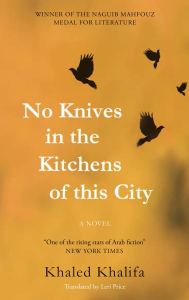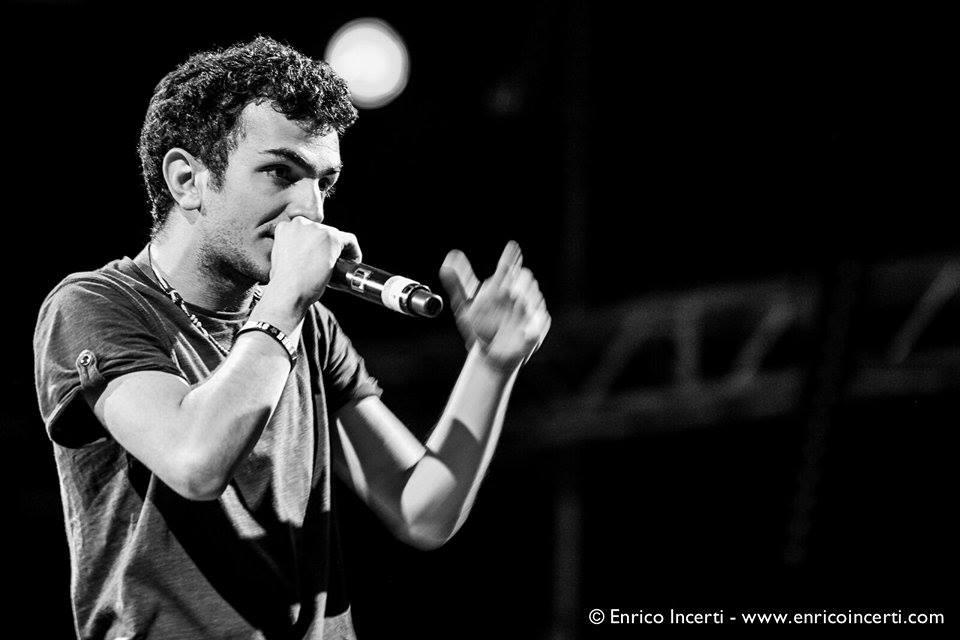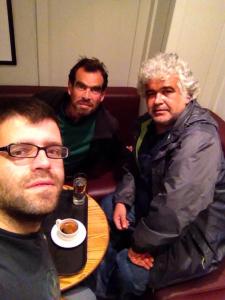Posts Tagged ‘Khaled Khalifa’
Khaled’s Death is Hard Work
A slightly different version was published at The Markaz Review.
I remember Khaled in a beer garden in Bristol. He was sitting at a table performing the English language: “So so so,” he sang. “And and and, but and but! and so… but! so… but!” Khaled inhabiting his stocky body, his warm, brimming smile, his big head of fluffy white hair.
Of course he knew far more words than those. He somehow managed to communicate very well in English without speaking it very fluently. In Arabic he talked and talked, like the tide. Sometimes he broke into song. His writing was brilliant, the kind that will last for many generations. A poet, screenwriter, novelist — he was endlessly playful with words. And he was gentle with life, and with people. He took them very seriously.

I was with him at the BBC one evening in June 2014. ISIS had captured Mosul, and using the money looted from the city’s banks, and the American weapons captured from the fleeing Iraqi army, the organization had rapidly seized vast swathes of eastern Syria, areas which had been previously liberated from the Assad regime. The radio presenter asked Khaled what he thought of it all. His answer — “It’s important to pay attention to the role of Iran” — may have confused non-experts at the time, but was absolutely apt.
He was politically acute, although he wasn’t primarily a political person. He was a humanist, an artist, and a Syrian who cared deeply about Syrians. Once, as we toured England to introduce the Syria Speaks anthology, Khaled met refugees from villages near his own in the Aleppo countryside. “They asked me about the olive trees and the seasons,” he grinned afterwards. “I love these people.”
He liked the concrete, material detail of life, and was aware of the dense social webs connecting people. This comes through in his writing, in its sensuousness and physicality as well as in its careful intricacies of plot and character. His novels are beautiful and rewarding, but not always easy reading. The stories often proceed in narrative swirls and mosaics rather than in linear fashion. This form manifests a kind of realism, because in real human life everywhere, not only in Syria, characters are woven from stories, and stories link to further stories …
Read the rest of this entry »No Knives in the Kitchens of this City
 This review of the latest novel by Khaled Khalifa – an examination of Aleppo’s decades-long strangulation at the hands of the Assad regime – was published at the Guardian.
This review of the latest novel by Khaled Khalifa – an examination of Aleppo’s decades-long strangulation at the hands of the Assad regime – was published at the Guardian.
Were Syrians wise to revolt? Aren’t they worse off now?
Such questions misapprehend the situation. Syrians didn’t decide out of the blue to destroy a properly functioning state. The state had been destroying them, and itself, for decades. “No Knives in the Kitchens of this City”, the new novel by Khaled Khalifa, chronicles this long political, social and cultural collapse, the incubator of contemporary demons.
The story stretches back to World War One and forward to the American occupation of Iraq, but our narrator’s “ill-omened birth” coincides with the 1963 Baathist coup. The regime starts off as it means to continue. The maternity hospital is looted and emptied of patients. Soon the schools and universities are purged. Only pistol-toting loyalist professors survive. Public and individual horizons shrink as the president’s powers grow beyond all limits, through Emergency Law, exceptional courts, and three-hour news broadcasts covering “sacred directives made to governors and ministers”.
The novel follows a large and well-drawn cast – a family, their friends, enemies and lovers – back and forward across three generations. This multiple focus and enormous scope turns the setting – the city of Aleppo – into the novel’s central ‘character’. “Cities die just like people,” Khalifa writes. So ancient neighbourhoods are demolished, and lettuce fields give way to spreading slums.
“No Knives in the Kitchens of this City” won the Naguib Mahfouz Medal for Literature. As in many of Mahfouz’s novels, Khalifa’s urban environment develops a power somewhere between metaphor and symbol: “The alley was witness to the destruction of my mother’s dreams, and the idea of this alley grew to encompass the length and breadth of the country.”
The Sound and The Fury
 This was first published (with some great links) at the Guardian. Picture is Abu Hajar. More stories about him and many others in our forthcoming book ‘Burning Country: Syrians in Revolution and War’.
This was first published (with some great links) at the Guardian. Picture is Abu Hajar. More stories about him and many others in our forthcoming book ‘Burning Country: Syrians in Revolution and War’.
In the first heady weeks of the Arab Spring commentators made much of the role played by social media, and certainly Facebook in particular provided an indispensable tool to young revolutionaries throughout the region. But less noticed, and ultimately far more significant, was the carnivalesque explosion of popular culture in revolutionary public spaces.
The protests in Syria against Bashaar al-Assad’s dictatorship were far from grim affairs. Despite the ever-present risk of bullets, Syrians expressed their hopes for dignity and rights through slogans, graffiti, cartoons, dances and songs.
To start with, protestors tried to reach central squares, hoping to emulate the Egyptians who occupied Tahrir Square. Week after week residents of Damascus’s eastern suburbs tried to reach the capital’s Abbasiyeen Square, and were shot down in their dozens. Tens of thousands did manage to occupy the Clock Square in Homs, where they sang and prayed, but in a matter of hours security washed them out with blood.
This April 2011 massacre tolled an early funeral bell for peaceful protest as a realistic strategy. In response to the unbearable repression, the revolution gradually militarised. By the summer of 2012 war was spinning in downward spiral: the regime added sectarian provocation to its ‘scorched earth’ tactics of bombardment and siege; foreign states and transnational jihadists piled in; those refugees who could got out.
Civil revolutionaries did their best to adapt. Alongside self-organising committees and councils, Syrians set up independent news agencies, tens of radio stations and well over 60 newspapers and magazines. Kafranbel, for instance, a rural town become famous for its witty and humane slogans, broadcasts discussion, news and women’s programmes on its own ‘Radio Fresh’ – despite a recent assault by Jabhat al-Nusra fighters. And Enab Baladi (My Country’s Grapes), is a newspaper published by women in Daraya, a besieged, shelled and gassed Damascus suburb. Remarkably, the magazine focuses on unarmed civil resistance.
As a result of both security concerns and communal solidarity, anonymous cooperative endeavours proliferated, amongst them photography collectives such as the Young Syrian Lenses.
Syria Speaks on Tour
This was published at the National…
For a week in June, Syrian writers and artists toured England, giving readings and workshops to promote “Syria Speaks: Art and Culture From the Frontline”, a book reflecting the country’s new revolutionary culture. British-Syrian novelist Robin Yassin-Kassab describes the experience.
*
In Bradford we met a woman who had tried as hard as she could to forget she was Syrian. We didn’t discover her original trauma, but we heard its symptoms over a British-Pakistani curry. She hadn’t spoken Arabic for years, and never told anyone where she was from. Once a policeman detained her for an hour because she refused to tell him her origin.
In Bristol, on the other hand, we met a little old woman who, with her red hair and flowery dress, we might have mistaken for English. But she was a Damascene, and she wept when I read a description of her city. Afterwards she came to introduce herself. “I’ve lived in England for thirty years, and I didn’t realise until the revolution that I had a fear barrier inside. Then I noticed I’d never talked about Syria. I’d tried not to even think about it. But those brave youths gave me courage; they gave me back my identity and my freedom.”
So the Syrian revolution is alive and well in Bristol if not in Bradford, for this is where the revolution happens first, before the guns and the political calculations, before even the demonstrations – in individual hearts, in the form of new thoughts and newly unfettered words. Syria was once known as a ‘kingdom of silence’ in which public discourse was irretrievably devalued by enforced lip-service to the regime and its propaganda pieties. As a result, many Syrians describe their first protest as an ecstatic event, a kind of rebirth. In “Syria Speaks”, Ossama Mohammed’s story “The Thieves’s Market” concerns a woman who attends the state’s official demonstrations, until her friend is murdered for participating in an oppositional one. “I grew up,” she says, “came of age, abandoned someone and was abandoned, on a march that finished yesterday.” When that coerced march ended and a thousand new ones began, Syrians found unprecedented liberation simply by expressing honest opinions in the presence of their neighbours, by breaking the barriers of fear.
Syria Speaks on Front Row
I spent the last eight days on tour with Syria’s greatest novelist Khaled Khalifa, artist Khalil Younis, and writers Malu Halasa and Zaher Omareen. We were promoting the Syria Speaks book, a collection of art, cartoons, essays, short stories and novel extracts from revolutionary Syria. It felt useful to approach the subject through human stories rather than banging the head against the tired old political discourses. I’m writing about the tour and book for a piece which should be published next month. In the meantime, here on BBC Radio 4’s Front Row, Khaled, Malu and I discuss the new culture, Khaled’s experience under bombs, and the ISIS phenomenon.
In Praise of Hatred
 I was honoured to be asked to write the introduction to the English translation of Khaled Khalifa‘s third novel, In Praise of Hatred – set in Syria in the 1980s and essential background reading for the current tragedy. Four paragraphs of the introduction are reprinted below, and then Maya Jaggi’s review in the Guardian.
I was honoured to be asked to write the introduction to the English translation of Khaled Khalifa‘s third novel, In Praise of Hatred – set in Syria in the 1980s and essential background reading for the current tragedy. Four paragraphs of the introduction are reprinted below, and then Maya Jaggi’s review in the Guardian.
So how brave and necessary it was to write a fiction of the events. In our narrator’s harsh euphemism, Alawis are “the other sect” and the Ba‘ath Party is “the atheist party”, but the historical references are unmistakeable. Khalifa plays one of the noblest roles available to a writer: he breaks a taboo in order to hold a mirror to a traumatised society, to force exploration of the trauma and therefore, perhaps, acceptance and learning. He offers a way to digest the tragedy, or at least to chew on its cud. In this respect he stands in the company of such contemporary chroniclers of political transformation and social breakdown as Gunter Grass and JM Coetzee.
In purely literary terms as well as politically, the novel rises to a daunting challenge: how to represent recent Syrian history, which has often been stranger and more terrible than fiction.
For a start, it’s a perceptive study of radicalisation understood in human rather than academic terms. It accurately portrays violent Islamism as a modernist phenomenon, a response to physical and cultural aggression which draws upon Trotsky, Che and Regis Debray as much as the Qur’an, and contrasts it with the more representative Sufism of Syrian Sunnis.
Next, it examines the dramatic transformations of character undergone by people living under such strain, the bucklings and reformations, the varieties of madness. The characters here are fully realised and entirely flexible, even our bitter narrator, and their stories are told in a powerfully rhythmed prose which is elegant, complex, and rich in image and emotion. There is musicality too in the rhythm of the episodes, the subtle unfolding of the plot.
Beirut Three: Social Life
I’ve just come back from the Hay Literature Festival in Beirut. Literature Across Frontiers asked me to write three posts on the experience. Here’s the third.
At this year’s Karachi Lit Fest, Hanif Qureishi asserted that the purpose of such festivals was “to give writers a social life.” I concur wholeheartedly, but still I admit I was a little scared to go to Beirut and socialise there. This is because several Syrians had advised me to avoid speaking about the revolution while in the city, and to watch my back in areas controlled by Syrian regime allies. “They know who you are,” they muttered darkly.
But I was fine. At no point did I feel under any threat. I presume the warnings tell us more about the fear so successfully planted in Syrian hearts than they do about the capacity of the flailing regime to hunt down obscure writers. True, one Syrian slit another Syrian’s throat outside the Yunes Cafe just a couple of minutes’ walk from my hotel one night. Reports varied as to whether the killing was personally or politically motivated. And true, writer Khaled Khalifa’s arm was still in a sling after being broken by regime goons during the funeral of murdered musician Rabee Ghazzy back in May. Khaled, whose most famous novel ‘In Praise of Hatred’ is about to be published in English by Doubleday (I’m writing the introduction), is a warm and gentle man who smiles irrepressibly despite it all. He spoke fearlessly during his event at the Hay Festival. He’ll be back in Syria now. In Beirut I asked him why he didn’t stay outside, in safety. He said he can’t, he becomes scared for his friends and family when he’s outside.
I spent one inspiring evening with a group of Syrian revolutionaries, supporters of the Free Syrian Army who confound the stereotypes propounded by the regime and picked up on by certain infantile leftists. Far from being Salafists and tools of imperialism, these were secular men and women (one of Christian background) sharing a flat and ideas, drinking whiskey and mate, reflecting on the surging movement of the recent past and checking internet updates on the immediate present. They were well-informed, intelligent, and nuanced in their thinking (at one point we discussed the nature of evil and the complex question of individual culpability). They had seen nasty things, yet talking to them made me surprisingly buoyant. They believed they were winning their fight.



